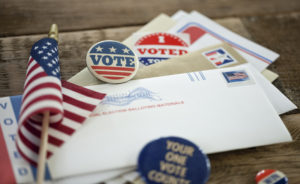
With the election imminent, the Supreme Court and other courts weigh in, and more…
IN THE NEWS
- The U.S. Supreme Court granted a stay order permitting Virginia to remove voters from voter logs who did not affirmatively denote that they were citizens. The U.S. District Court for the Eastern District of Virginia originally blocked the program after the United States and public interest groups, including the Virginia Coalition for Immigrant Rights, brought suit. The district court order also required the defendants to restore registrants removed under the Virginia program, subject to certain limitations. Virginia Governor Glenn Youngkin called the Supreme Court decision “a victory for common sense and election fairness,” while Project Democracy noted that “the program removes eligible voters” and that the state “has not presented any evidence of noncitizens participating in elections.” Justices Sonia Sotomayor, Elena Kagan, and Ketanji Brown Jackson voted to deny the stay application.
- The Republican National Committee (RNC) and the Republican Party of Pennsylvania asked the U.S. Supreme Court to block the Pennsylvania Supreme Court’s decision to count provisional ballots from voters whose mail-in ballots were rejected due to errors. The RNC argued that the decision was unconstitutional because it “usurped” the state legislature’s “power to regulate federal elections” by changing rules so close to the 2024 presidential election. The two voters from the initial lawsuit, represented by the American Civil Liberties Union of Pennsylvania and others, countered that the guidance to count provisional ballots from failed mail-in voters was issued years ago. They also argued that the Supreme Court has no jurisdiction over “a question purely of state law.” The Pennsylvania Democratic Party contended that the RNC lacks standing to sue because “this case arose out of a Democratic primary.” The RNC asked for a ruling by Friday, only four days before the election.
- The U.S. Court of Appeals for the Fifth Circuit struck down a Mississippi statute that allowed ballots to be received up to five days after Election Day, holding that the statute was preempted by federal law. The court determined that “federal law requires voters to take timely steps to vote by Election Day” and that federal law does not allow states to “extend the period of voting.” The court did not issue injunctive or other relief, instead remanding the case to the district court to determine an appropriate remedy.
- The U.S. Court of Appeals for the Fifth Circuit ruled that the National Labor Relations Board (NLRB) exceeded its authority by ordering Elon Musk to delete a post on Twitter that threatened to take away benefits from Tesla employees who voted to unionize. The NLRB, finding that Musk’s threats violated the National Labor Relations Act, had ordered Musk to delete the post. In its 9-8 ruling, the Fifth Circuit found that the NLRB erred in ordering Musk to delete his post “as a remedy for unfair labor practices.” The dissenting judges would have enforced the NLRB’s orders across the board. They argued that “the First Amendment does not grant employers carte blanche to use their speech to commit labor violations” and found “ample historical precedent” supporting tweet deletion as a remedy. The court did not decide whether Musk threatened employees illegally and remanded the case to the NLRB for further proceedings.
- The U.S. District Court for the Northern District of Ohio rejected a challenge by the American Civil Liberties Union (ACLU) to an Ohio rule requiring naturalized citizens to show proof of citizenship before voting in certain instances. The Ohio rule requires naturalized citizens to show proof of citizenship when confronted by elections officials. The ACLU of Ohio contended that the rule will block legitimate voters from voting at polls, but the court dismissed its claim as “speculative.”
- A rule by the U.S. Department of Transportation requiring airlines to provide customers with cash refunds for significantly delayed or canceled flights went into effect on Monday. The rule mandates that airlines provide passengers with refunds as opposed to vouchers and also requires airlines to provide refunds within seven days to passengers purchasing tickets with a credit card and within twenty days to passengers using other forms of payment. Although the rule has faced backlash from the airline industry, Secretary of Transportation Pete Buttigieg commented that airlines must show passengers that they are entitled to refunds.
- The U.S. Department of Transportation issued a final rule aimed at increasing the safety of rail transit workers. The rule requires transit agencies to create roadway worker protection programs focused on increasing the safety of rail workers working near tracks. The rule also requires that transit agencies provide training for workers and report unsafe acts and working conditions. The rule is the first ever to mandate standards addressing worker protections for rail transit agencies.
- The U.S. Nuclear Regulatory Commission (NRC) proposed a rule that would establish a new licensing process for commercial nuclear power plants. The proposed process would adopt technology-inclusive approaches and use risk-informed, performance-based techniques to ensure safety. Plant designers and operators would have flexibility to determine “how their nuclear power plant will meet safety criteria.” The NRC expects the rule to result in net savings to the nuclear energy industry of between $53.6 million and $68.2 million per license applicant compared to existing licensing frameworks. The NRC is required by statute to create new rules that establish a technology-inclusive framework for licensing new advanced nuclear reactors by the end of 2027.
WHAT WE’RE READING THIS WEEK
- In a forthcoming article in the Widener Commonwealth Law Review, Christopher J. Walker, a professor at the University of Michigan Law School, argued that Congress must “reassert itself in federal lawmaking.” Walker explained that the Supreme Court’s limits on administrative power reflect concerns about both “over-presidentialism” and the “decline in legislative activity.” Rather than restore Congress’s power, however, Walker argued that these judicial limits either shift authority to courts or create a “deregulatory power void.” Walker proposed solutions for Congress, including stronger agency oversight, stricter appropriations control, a fast-track legislative procedure that would allow Congress to respond quickly when courts limit agency authority, and temporary legislation with expiration dates to force Congress to revisit programs regularly. Walker warned that, without a combination of these measures, the government risks failing to work effectively for the American people.
- In an article in the North Carolina Law Review, Erwin Chemerinsky, Dean of the University of California, Berkeley Law School, and Alex Chemerinsky, an appellate attorney at Greines, Martin, Stein, & Richland LLP, argued that if social media is regulated, it should be done by the federal government, not by state governments. Chemerinsky and Chemerinsky surveyed state laws that aim to regulate social media and urged that courts should invalidate those that violate the First Amendment or are preempted by federal law. They also contended that state regulation of social media is highly undesirable as a policy matter. The authors claimed that “allowing a proliferation of state regulations” will make it “impossible for internet platforms to comply,” and it will “dramatically limit the speech that all of us express and receive.”
- In an article in the Yale Journal on Regulation, Joshua C. Macey, an associate professor at Yale Law School, Shelley Welton, a professor at the University of Pennsylvania Carey Law School, and Hannah Wiseman, a professor at Penn State Law, argue that increased electric grid reliability regulations are needed in order for the electricity industry to transition to relying on renewable resources. Macey, Welton, and Wiseman argue that the North American Electric Reliability Corporation (NERC), a self-regulatory organization overseeing U.S. grid reliability, no longer has the absolute industry expertise needed to justify self-regulation as the grid reliability industry has begun utilizing more renewable energy sources. Macey, Welton, and Wiseman propose both internal and external reforms, including the addition of more public representatives to NERC’s board and independent committees to review NERC’s reliability standards, to better support modern grid reliability needs.
EDITOR’S CHOICE
- In an essay in The Regulatory Review, James Goodwin, the Policy Director of the Center for Progressive Reform, argued that a stronger regulatory system would encourage civic engagement, such as through participation in the voting process and protecting access to the ballot for other Americans. Goodwin noted the many ways that Americans can participate in the regulatory process and influence policy, such as through the notice-and-comment rulemaking process and petitioning to compel rulemaking. Goodwin wrote that “regulatory protections enhance freedom” and that the ability to exercise Americans’ right to vote “necessitates a stronger and more inclusive regulatory system.”



